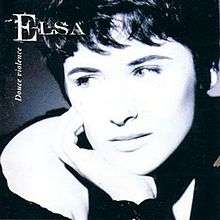Douce violence (album)
Douce violence is the third album of the French singer Elsa Lunghini, and it was released in 1992.
| Douce violence | ||||
|---|---|---|---|---|
 | ||||
| Studio album by | ||||
| Released | September 16, 1992 | |||
| Recorded | 1992 | |||
| Genre | Pop | |||
| Length | 42:12 | |||
| Label | BMG-Ariola, Neige Music | |||
| Producer | Raymond Donnez, Georges Lunghini | |||
| Elsa Lunghini chronology | ||||
| ||||
| Singles from Douce Violence | ||||
Background and critical reception
In this album, when she was only 19, she began to disassociate herself from his father, the composer Georges Lunghini. Understanding her phobias, he wrote songs including "Bouscule-moi" or "Tout l'temps, tout l'temps." There are also four songs written by Jean-Loup Dabadie.
This album met with less success than previous ones, although it was certified Gold,[3] and marked the singer's change of look : indeed, she appeared more adult with a very short cut.
The singles from this album were less successful than the previous one : "Bouscule-moi" was the only one that reached the French Singles Chart, but it failed to enter the top ten (#14).
Track listing
| # | Title[4] | Length |
|---|---|---|
| 1. | "Supplice chinois (toop toop)" (Jacques Duvall / Georges Lunghini) | |
| 2. | "C'est bien, c'est mal" (Jean-Loup Dabadie / Raymond Donnez - Georges Lunghini) | |
| 3. | "Être ensemble" (Jean-Loup Dabadie / Georges Lunghini) | |
| 4. | "Jamais toujours" (Jacques Duvall / Raymond Donnez - Georges Lunghini) | |
| 5. | "Mercurochrome" (Jacques Duvall / Georges Lunghini) | |
| 6. | "Bouscule-moi" (Jacques Duvall / Raymond Donnez - Georges Lunghini) | |
| 7. | "Le cœur ailleurs, l'amour ailleurs" (Jean-Loup Dabadie / Raymond Donnez - Georges Lunghini) | |
| 8. | "Parfums d'amour" (Jacques Duvall / Georges Lunghini) | |
| 9. | "Amoureuse, moi ?" (Jacques Duvall / Raymond Donnez - Georges Lunghini) | |
| 10. | "Tout le temps, tout le temps" (Jean-Loup Dabadie / Raymond Donnez - Georges Lunghini) | |
| 11. | "Changer sa vie" (Gérard Presgurvic / Vincent-Marie Bouvot - Georges Lunghini) |
Album credits
Personnel
- Raymond Donnez - programming
- Celmar Engel - synthesizer
- Claude Salmiéri - drums
- Roger Secco - drums
- Denis Benarrosh - percussion
- Bernard Paganotti - bass guitar
- Jannick Top - bass guitar
- Gérard Bikialo - piano
- Michel-Yves Kochmann - guitar
- Basile Leroux - guitar
- Patrice Tison - guitar
- Elsa - backing vocals
Production
- Arranged by Raymond Donnez
- Produced by Raymond Donnez & Georges Lunghini
- Engineered by Didier Bader & Bruno Lambert
- Mixed by Bruno Lambert at Studio Marcadet, Paris
- Amoureuse, moi ? mixed by Andy Scott
Design
- Jean-Daniel Lorieux - photography
- ★ Bronx - design
Charts, certifications and sales
Certifications and sales
| Region | Certification | Certified units/sales |
|---|---|---|
| France (SNEP)[6] | Gold | 212,700[7] |
References
|
gollark: On what?
gollark: Can you not just... remove that part?
gollark: "Bare"?
gollark: Yes.
gollark: Actually, according to the Cayley-Hamilton theorem, a matrix satisfies its own characteristic equation.
This article is issued from Wikipedia. The text is licensed under Creative Commons - Attribution - Sharealike. Additional terms may apply for the media files.